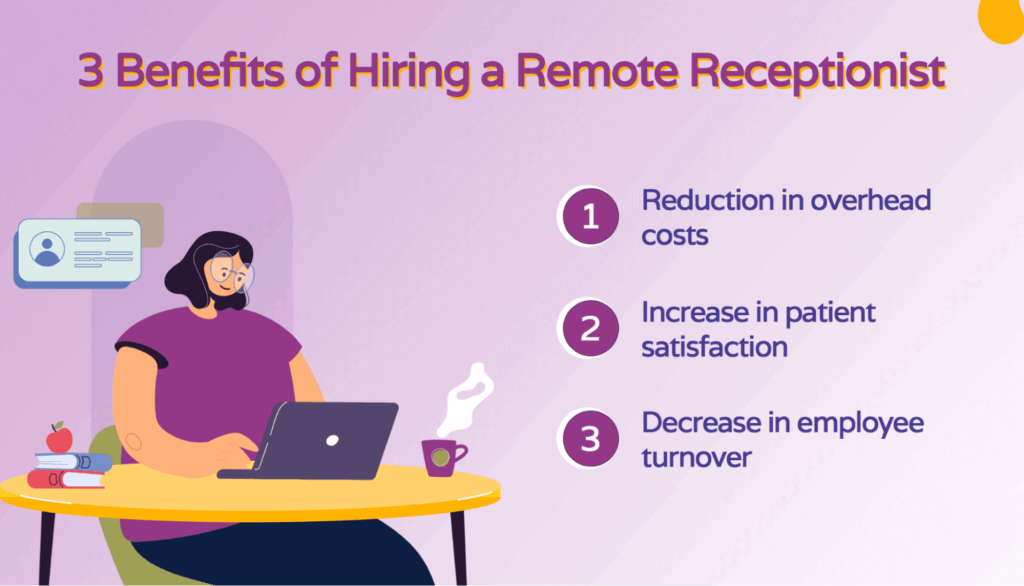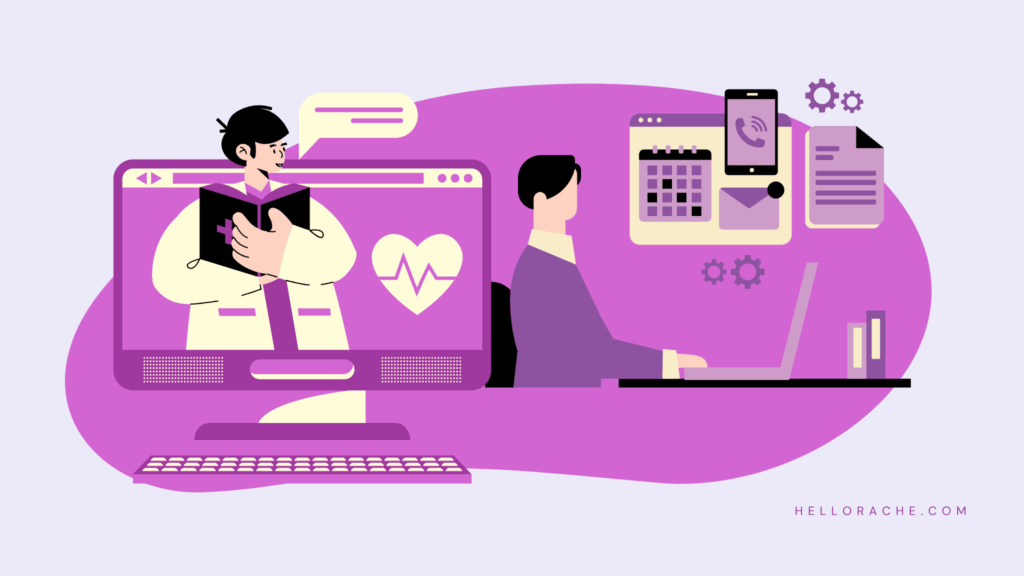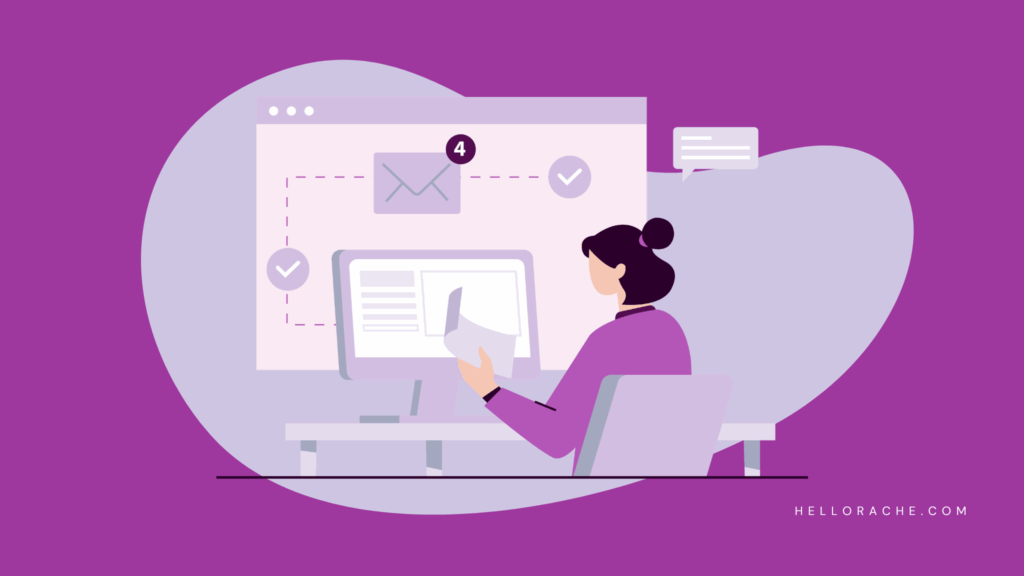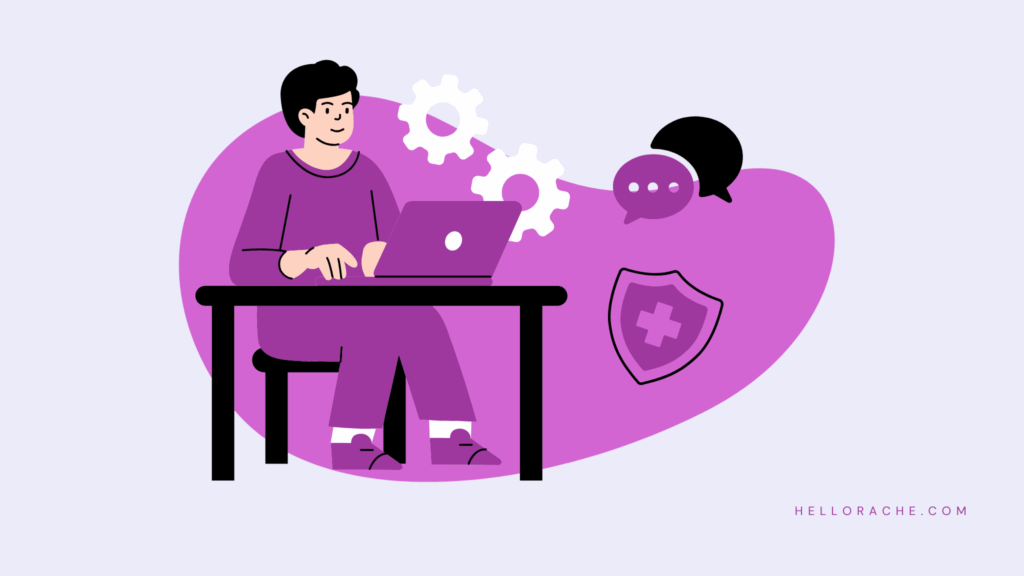It's no secret that the medical industry is booming. According to recent data, the number of jobs in the healthcare sector will only continue to grow in the years ahead. As a result, many entrepreneurs and healthcare professionals are looking for ways to expand their businesses and offer more services to their patients. One way that many of these professionals choose to do this is by hiring a remote receptionist.
There are ample benefits to hiring a virtual medical receptionist for your practice. From saving money on overhead costs to increasing patient satisfaction, there are plenty of reasons to consider this option. This article will cover what you need to know about hiring a remote receptionist for your practice, including the benefits and what to look for in potential clients.
What is a remote receptionist?
A remote receptionist is a virtual assistant who handles some of the tasks an in-office receptionist would normally handle to help provide better service and alleviate some of the workload for medical professionals. These tasks can include answering incoming calls, scheduling appointments, confirming appointments, and collecting patient payments.
Some remote receptionists may also be responsible for managing the scheduling software, handling patient inquiries, and sending reminders for upcoming appointments. While the duties of a remote receptionist will vary depending on the needs of the medical practice, they are typically responsible for handling many of the same tasks as an in-office receptionist.
However, it is crucial to understand that while a remote receptionist helps to alleviate some of the workload for medical professionals, they are not intended to replace an in-person receptionist altogether. Instead, they should be used in addition to an in-person receptionist to help improve the office's overall efficiency.
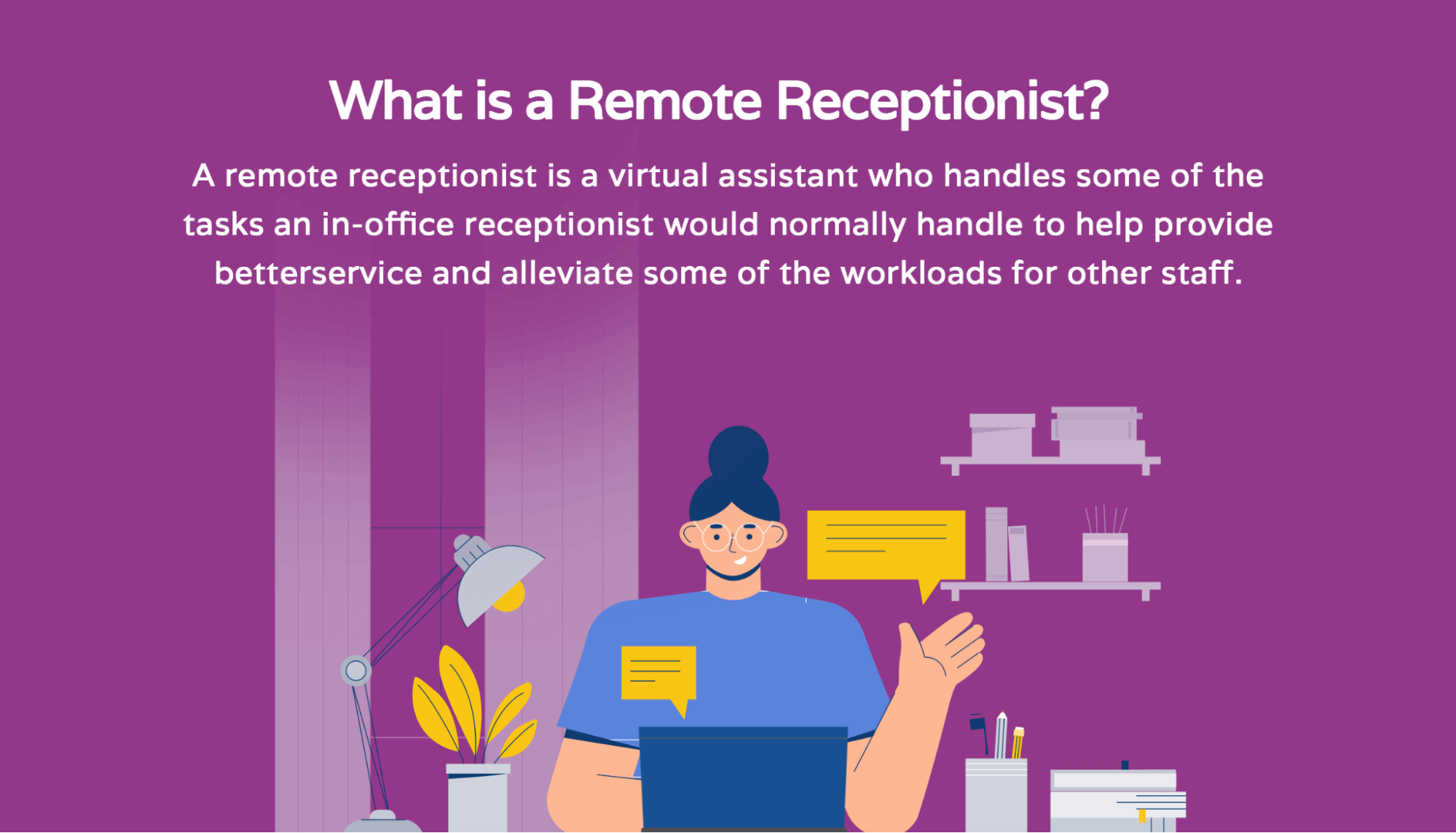
Additionally, a Virtual Administrative Assistant can be a great option for those seeking a more flexible schedule. If you want to promote after-hours or weekend appointment scheduling, a remote receptionist can be a great way to make this happen.
Hello Rache is the leading provider of remote receptionist services. Learn more about how it works by visiting the website or scheduling a call with our team.
What does a remote receptionist do?
There are many different tasks that a remote receptionist can be responsible for, but the most common duties include:
Answering phone calls
One of the primary roles of a remote receptionist is to answer phone calls from patients. Many remote receptionists use a VoIP phone system, which allows them to answer calls from anywhere. This helps free up the time of medical professionals so they can focus on providing care.
Scheduling appointments
Another common duty of a remote receptionist is to schedule appointments for patients. This includes confirming, rescheduling, and canceling appointments. Without a remote receptionist, medical professionals would have to handle these tasks themselves, which can take away from the time they have to care for patients.
Making confirmation calls
In addition to scheduling appointments, remote receptionists are also responsible for making confirmation calls to patients. This helps ensure patients remember their appointment and show up on time. Using a reminder system, such as Hello Rache's appointment reminder system, can help automate this process.
Taking messages
When patients call the office and no one is available to answer, the remote receptionist will take a message. This ensures that the patient's inquiry is not forgotten and that someone will get back to them as soon as possible.
Directing patients to the proper resources
When patients call with questions that the remote receptionist cannot answer, they will direct the patient to the proper resources.
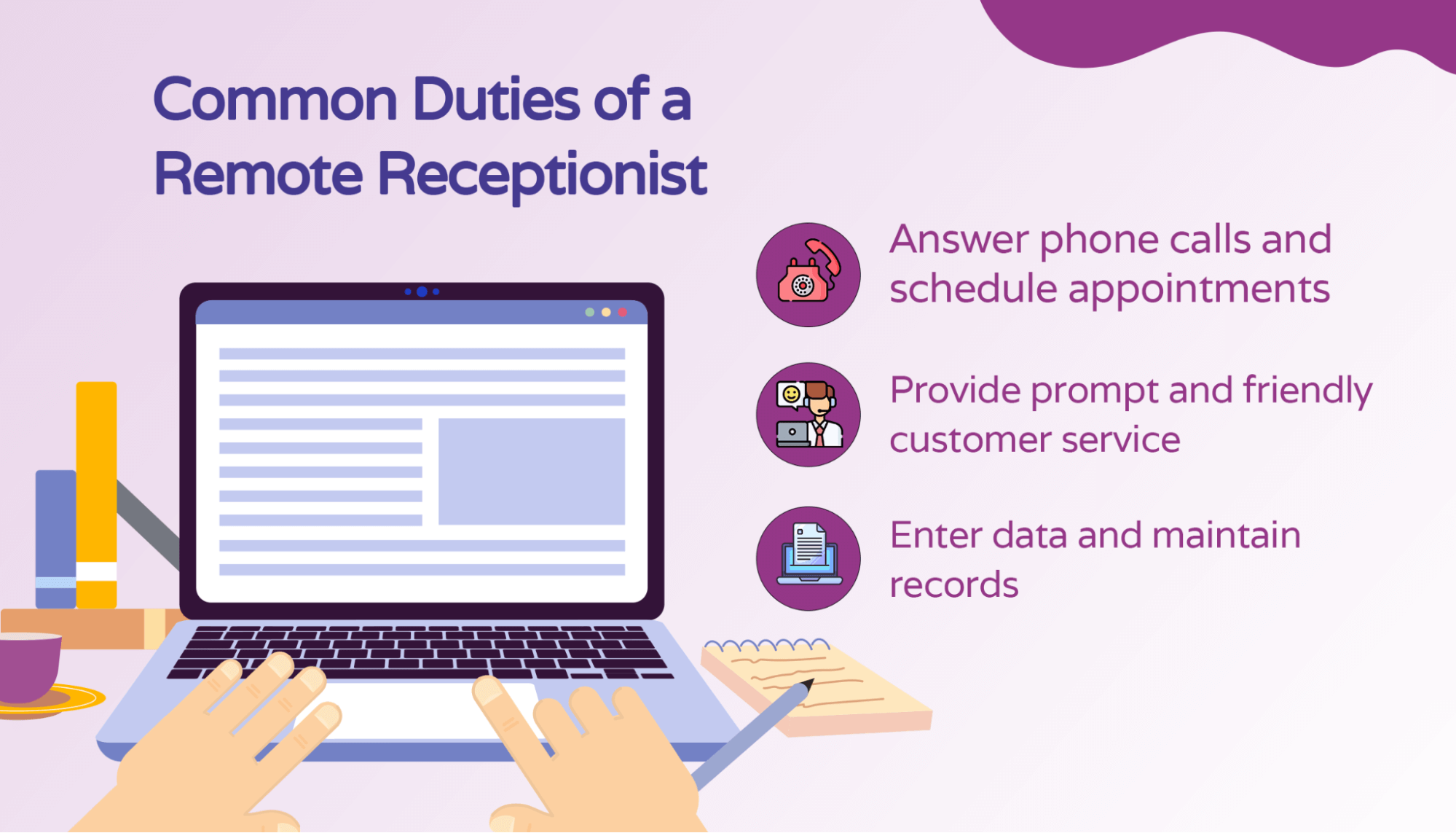
This may include the medical practice's website, another staff member, or a healthcare hotline.
Entering data into the EHR
One of the most significant duties of a remote receptionist is to enter data into the practice's electronic health record system. This helps keep track of patients' medical history and makes it easier for medical professionals to provide care.
Handling referrals
When patients need to be seen by a specialist, the remote receptionist will handle the referral process. This includes contacting the specialist's office, scheduling appointments, and sending the patient's medical records.
Maintaining patient records
In addition to entering data into the EHRA, the remote receptionist is responsible for maintaining patient records. This includes updating contact information, scheduling follow-up appointments, and filing paperwork. Some states have strict laws about patient documentation, so it's important that the practice stays up to date.
Filing insurance claims
Another common duty of a remote receptionist is to file insurance claims. Some common duties include gathering documentation, submitting the claim, and following up with the insurance company. These types of tasks can be time-consuming, so it's helpful to have someone dedicated to this process.
These are just some of the most common duties of a remote receptionist. Depending on the needs of the practice, a remote receptionist may also be responsible for other tasks, such as handling billing and collections, managing social media, or creating marketing materials.
Key skills of a remote receptionist
Hiring a remote receptionist is a great way to free up the time of medical professionals, but it's important to find someone with the right skills.
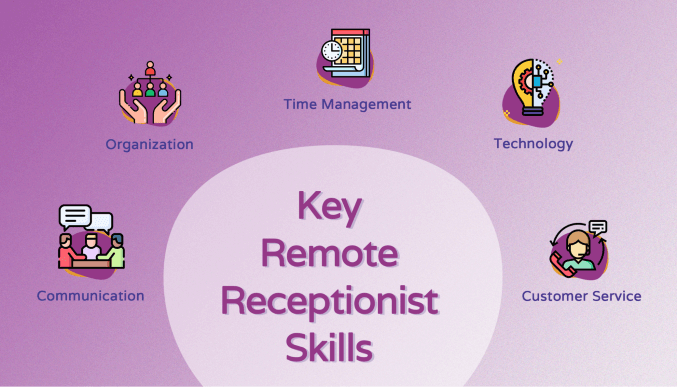
Some of the key skills include:
Excellent written and verbal communication skills
One of the most important skills of a remote receptionist is excellent communication. This includes effectively communicating with patients, medical professionals, and insurance companies. Without good communication, providing quality patient care and customer service will be difficult.
Attention to detail
Another important skill of a remote receptionist is attention to detail. This includes being able to accurately enter data into the electronic records system and filing insurance claims. It's also important to be able to follow up with patients and keep track of their appointments.
Strong organizational skills
A remote receptionist also needs to have strong organizational skills. This includes being able to keep track of patients' medical records, scheduling appointments, and making confirmation calls. One of the biggest challenges of being a remote worker is staying organized, so this is a key skill to watch for in a professional receptionist.
Proficiency in technology
In today's world, it's important to be proficient in technology. This includes using electronic health records, appointment scheduling, and other practice-specific software. The ability to troubleshoot technical issues is also important.
There are virtually an unlimited number of tasks that a remote receptionist can perform. However, these are some of the most standard duties. When looking for a remote receptionist, finding someone with the right skills and experience for your business needs is crucial.
The benefits of hiring a remote receptionist
There are ample benefits of hiring a remote receptionist. Perhaps the most significant benefit is that it can free up the time of medical professionals. Instead of having to handle administrative tasks, they can focus on providing quality patient care.
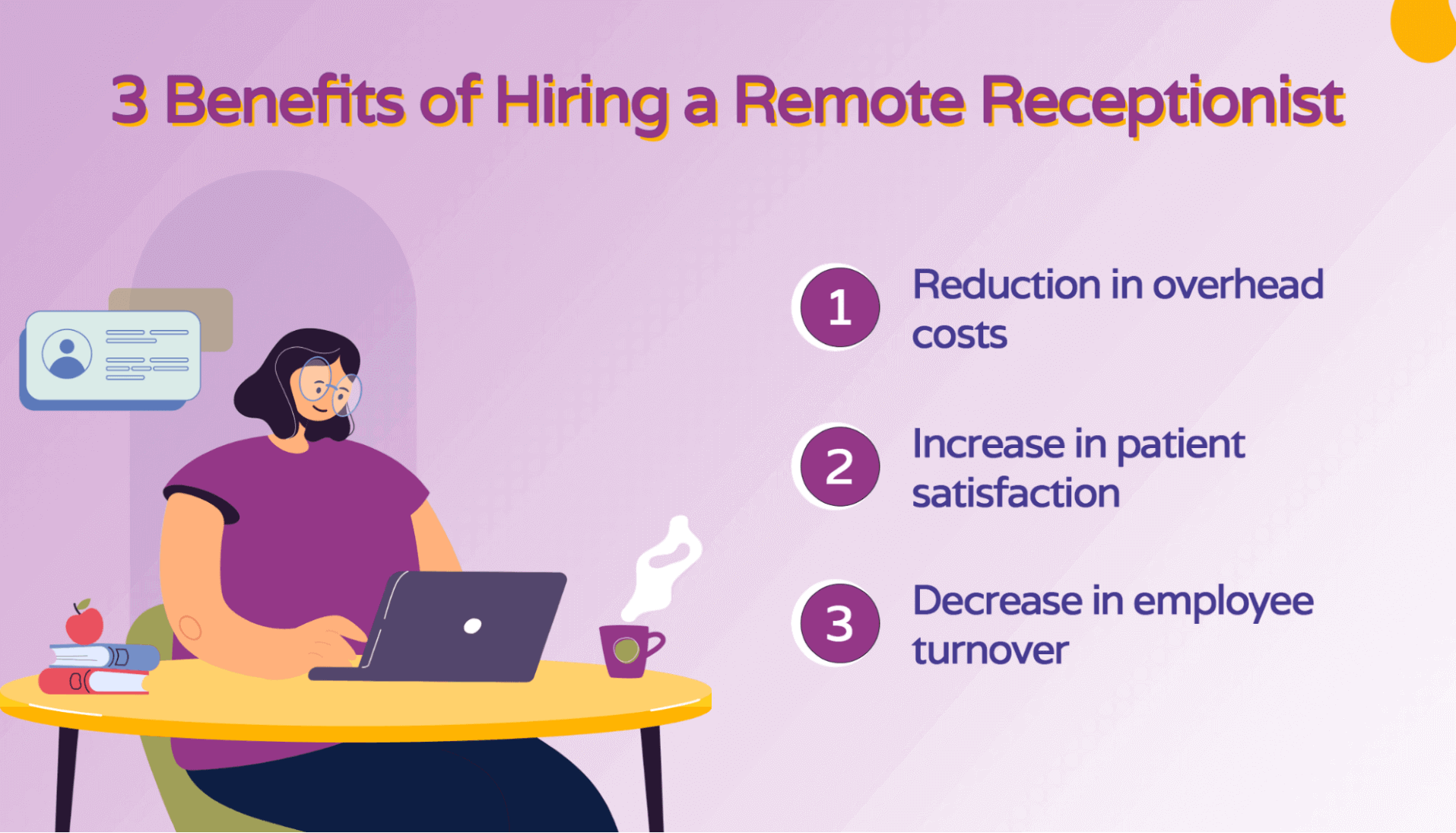
Some additional benefits include:
Reduced overhead costs
One of the most prominent benefits is reducing overhead costs. This results from less overtime, fewer benefits, and streamlined office procedures. Businesses can save significantly on both payroll, benefits, and other overhead costs by hiring a virtual assistant. Having your in-house staff focus on their clinical duties can also improve productivity and patient satisfaction.
Improved patient satisfaction
Another benefit of hiring a remote receptionist is improving patient satisfaction. This is because patients will have someone dedicated to their care. They won't have to wait on hold or be transferred to different departments.
They can also get their questions answered promptly. All of these factors can lead to improved patient satisfaction and loyalty.
Improved work/life balance
One of the challenges of working in the medical field is the long hours. This can lead to a lack of work-life balance and ultimately, burnout. Hiring a remote receptionist can help alleviate some of this pressure from your in-house staff. Medical professionals can focus on their clinical duties, and they can handle administrative tasks. This can lead to a better work-life balance for everyone involved.
Eliminate the need for an answering service
Answering services can be expensive and don't always provide the best customer service. Many providers are left feeling frustrated with the service. When you hire a remote receptionist, you can eliminate the need for an answering service. This can help you personalize the patient experience and improve customer satisfaction.
Decreased turnover
Finally, hiring a remote receptionist can help decrease turnover. This is because you'll have a dedicated staff member who is familiar with your office procedures. They won't have to be trained on the latest software or system updates. This can lead to reduced training costs and a more stable workforce.
These are merely some of the advantages of hiring a remote receptionist. Considering all the factors, it's easy to see why this is such a popular option for doctors and medical practices. The constantly changing medical landscape requires practices to be nimble and adaptable. The ability to hire a remote receptionist gives practices the flexibility they need to stay ahead of the curve.
Salary and demand for Remote Receptionists
The salary for a remote receptionist can vary depending on experience, location, and the size of the medical practice. There are considerable variables that will affect the salary of a remote receptionist, but national estimates put the average salary at $42,000 per year. Outsourcing your remote reception needs helps streamline these costs and provides significant savings for your medical practice.
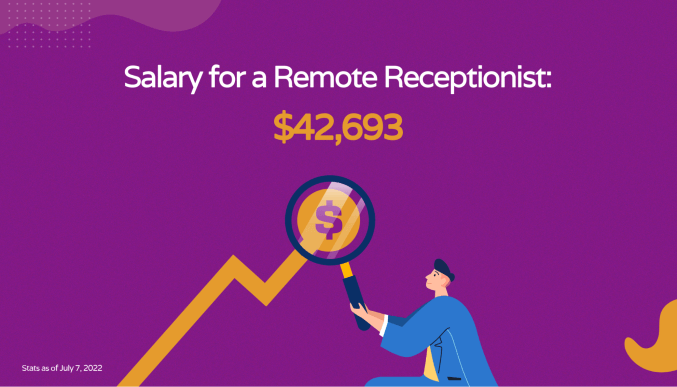
The demand for remote receptionists is expected to grow in the coming years. This is due in part to the Affordable Care Act. The ACA has led to an increase in the number of patients who are covered by insurance. As a result, there is a more imminent need for medical services. This increased demand has put a strain on the current medical workforce. Hiring a remote receptionist can help alleviate some of this pressure.
Many aspiring remote receptionists choose to obtain a certification in medical office administration. This type of certification can be obtained from a community college or online. The coursework for this type of program covers topics such as medical billing, coding, and insurance.
As a provider, ensuring that your remote receptionist has the skills and knowledge necessary to provide excellent customer service is crucial. In addition, you'll want to ensure they are familiar with your office procedures. This will help minimize training time and costs while also ensuring that they provide the best possible service to your patients.
When you consider all of the advantages of hiring a remote receptionist, it's easy to see why this is such a prevalent option for medical practices. The ability to reduce costs, improve patient satisfaction, and improve work-life balance make it an attractive option for practices of all sizes. If you're looking for a way to transform your medical practice, consider a Virtual Receptionist from Hello Rache. All our virtual staff have a background in the medical profession, and are available for the affordable flat hourly rate of $9.50 per hour.
Eliminate the need for an answering service with a remote receptionist
Hiring a remote receptionist is a great way to improve your medical practice. They can help to reduce costs, improve patient satisfaction, and increase work/life balance. In addition, they are familiar with your office procedures and can provide excellent customer service. There are numerous benefits, but one of the most important is that they can eliminate the need for an answering service.
Working with Hello Rache is a great way to improve your medical practice. We work with the best virtual receptionists in the industry. Our receptionists actually have experience and education in the medical field, ensuring that they can provide the highest quality customer service without the risk of miscommunication. In addition, we work with you to customize a plan that meets the specific needs of your practice.
Schedule a consultation with us today to learn more about how we can help you improve your medical practice.

